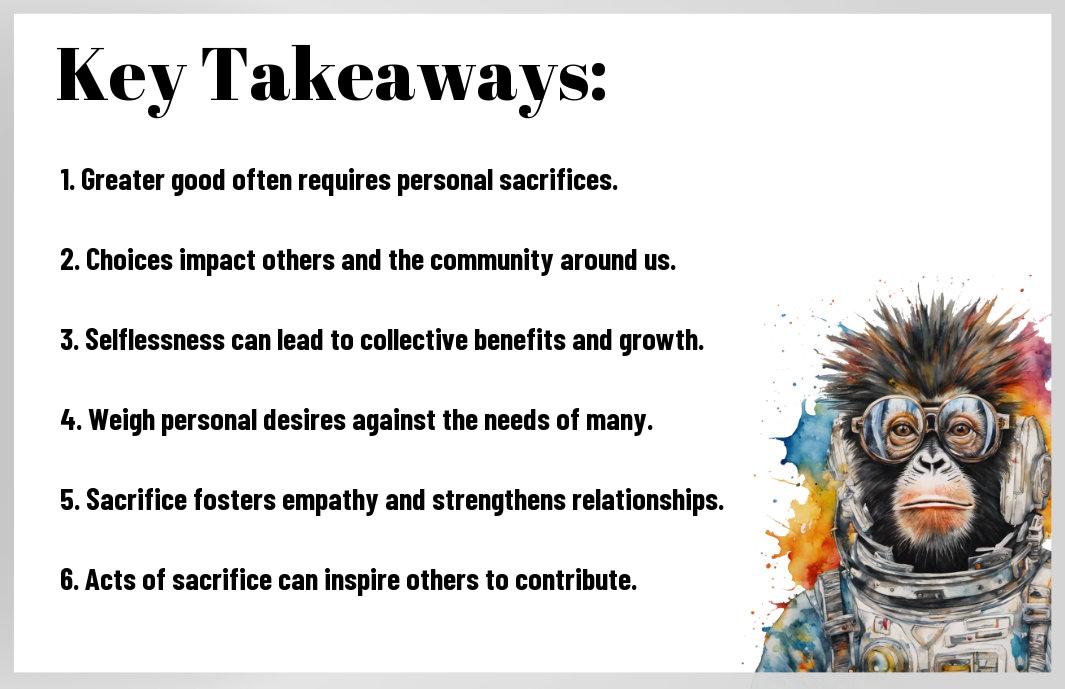
Newsletter Subscribe
Enter your email address below and subscribe to our newsletter

Enter your email address below and subscribe to our newsletter

Sacrifice is often needed in our lives when we aim for a larger purpose. I have found that sometimes you must relinquish personal desires to benefit others, creating a positive impact in your community or relationships. By making these difficult choices, you can foster growth, understanding, and connection. Understanding the depth of sacrifice can help you to evaluate what truly matters and prioritize the greater good over personal gain. This journey, while challenging, can lead to profound fulfillment and transformation.

The concept of sacrifice probes deep into our moral fiber, often challenging us to prioritize the needs of others over our own desires. In various contexts, we may find ourselves faced with decisions that can significantly impact not just our lives, but the broader community or environment. It is in these moments that understanding what sacrifice truly means becomes vital for our growth and empathy.
For many, sacrifice is defined as the act of giving up something valuable for the sake of something else deemed more important. This can manifest in various forms, whether it’s personal sacrifices for loved ones, environmental concerns, or societal progress. Understanding the context surrounding these decisions empowers you to appreciate the depth of commitment involved.
By examining historical instances, we can gain insights into the profound impact of sacrifice. Examples like the selfless actions of soldiers in wartime or activists fighting for civil rights showcase how individuals have put their own lives and well-being at risk for the sake of others.
In addition to well-known examples, there are countless instances where individuals acted in the face of adversity. Consider the story of the unsung heroes during the civil rights movement, who sacrificed their safety for the sake of equality. These individuals faced intimidation and violence yet persevered, embodying the spirit of sacrifice for the greater good. Furthermore, historical figures like Mahatma Gandhi and Martin Luther King Jr. made extraordinary sacrifices in their commitment to non-violence and justice, influencing the course of history. These powerful narratives serve as reminders that the sacrifices we make can inspire change and foster unity, encouraging you to embrace your own potential for impactful decisions.

If I reflect on the philosophy of sacrifice, it becomes clear that at the core of this concept lies a conflict between the individual self and the collective. Sacrifice often asks for personal loss to benefit others, urging us to weigh our desires against the needs of society. This tension highlights the delicate balance between self-interest and altruism, challenging us to explore our values and the implications of our choices on the greater community.
Ethical considerations play an integral role in discussions of sacrifice. I find that the act of sacrificing something for others raises complex questions about morality, duty, and justice. When I think about the potential impact of my choices, I must evaluate whether the benefits to the larger community truly outweigh the costs to the individual, leading me to ponder the nature of ethical responsibility in a sacrificial context.
Sacrifice is often linked to the idea of the greater good, where individual losses contribute to a collective benefit. This concept prompts me to ask: how far is one willing to go for the sake of others? It can manifest in various forms, from social justice movements to personal relationships. However, the danger lies in misinterpreting what the “greater good” truly is, as it can sometimes justify harmful actions under the guise of altruism.
Considering the greater good often leads me to evaluate the *motives* behind my sacrifices. While I may advocate for positive change, the potential to *exploit* this principle for negative purposes is significant. Such distortions can manifest when I see groups or individuals *harnessing* the idea of the greater good to manipulate public opinion or *legitimize* harmful actions. It becomes imperative to establish a critical lens through which I navigate these discussions, ensuring that my *commitment* to sacrifice does not inadvertently support *oppression* or injustice, but instead fosters *true progress* and empowers those genuinely in need.
Unlike the grand gestures often depicted in movies, sacrifice in everyday life manifests in small, yet significant ways. We frequently find ourselves at crossroads where personal desires must be set aside for the benefit of others, reinforcing our shared responsibility to create a better world. These everyday sacrifices shape our values, guiding us towards greater empathy and understanding.
Life often presents us with moments where personal ambitions or comforts must be relinquished for the sake of loved ones. Whether it’s sacrificing your free time to support a friend in need or giving up a career opportunity to prioritize family, these choices define our character and strengthen our relationships.
An necessary aspect of growth lies in how we contribute to our communities. When I engage in community service, I often find that I have to give up my time and resources. While these sacrifices might seem small to some, they create waves of positive change that inspire others to act.
Understanding the impact of our efforts on a larger scale can be transformative. When communities unite to tackle issues such as poverty or environmental challenges, the collective sacrifice fosters a sense of camaraderie and shared purpose. Every commitment to volunteer, donate, or advocate for change adds up, illustrating that our efforts can lead to a significant improvement in societal well-being. By valuing these sacrifices, you create a ripple effect, encouraging others to join in and contribute to the greater good.
For many, sacrifice is a complex interplay of emotions and cognitive processes, rooted deeply in our psychological frameworks. Understanding the motivations that drive individuals to make sacrifices provides insight into their values, moral beliefs, and emotional well-being. Often, the decision to give up something for a greater cause taps into deeper instincts such as altruism, empathy, and social bonding, revealing the intricate connections between our thoughts and actions.
Actions that lead to sacrifice are often fueled by an inner desire to contribute to something larger than oneself. Whether motivated by societal expectations, personal beliefs, or a sense of duty, individuals frequently recognize the impact their choices have on the lives of others. This profound drive can manifest in various forms, from small daily gestures to life-altering decisions, all influenced by the individual’s context and values.
Motivation to sacrifice can profoundly shape an individual’s identity and perspective. I’ve observed that making sacrifices often instills a sense of purpose, bringing deeper meaning to life. However, it can also lead to feelings of loss, resentment, or guilt if not managed wisely. Additionally, your actions can inspire others to follow suit, creating a ripple effect that enhances community ties and collective well-being. Yet, it’s important to balance self-care with altruism; if you overlook your own needs, you may compromise your health and happiness, which can ultimately undermine the positive impact you intend for others.

Once again, sacrifice manifests in diverse forms across different cultures, each embodying unique meanings and practices. In some societies, it may be tied to spirituality and religion, while in others, it represents personal or communal responsibility. Understanding these variations provides insight into how cultures prioritize and value collective well-being over individual desires, shaping their social norms and behaviors.
By examining religious perspectives on sacrifice, we find that it often symbolizes an offering to the divine, aimed at achieving favor or seeking redemption. In many traditions, acts of sacrifice are integral to spiritual practices, fostering a sense of community and reinforcing moral values. This deep connection between sacrifice and spirituality highlights its importance in guiding your ethical actions and beliefs.
Behind the lens of various societies, sacrifice can manifest in numerous ways, from selfless acts of service to potentially harmful traditions. Different cultures may emphasize voluntary personal sacrifices for family, community, or country, reflecting their collective values and priorities. On the contrary, some practices can be restrictive or oppressive, often challenging my understanding of what is deemed necessary for the greater good. This broad spectrum highlights the importance of context when discussing the role of sacrifice in human experiences.
Societies around the globe approach the idea of sacrifice differently, shaped by their history, values, and belief systems. From the revered sacrifices in indigenous cultures, reflecting deep ties to nature and community, to the extreme measures taken during wartime, it’s vital to consider the motivations behind these actions. I see that positive examples of sacrifice, such as altruism and volunteerism, elevate communal spirit, whereas darker interpretations can lead to toxic or coerced forms of sacrifice. This duality underscores the need for careful reflection on what we value and the sacrifices we are willing to make for a larger purpose.
All actions come with consequences, especially when it involves SACRIFICE Synonyms: 18 Similar Words. While some may bear a heavy weight, understanding what we might gain or lose from our sacrifices is vital. This journey requires introspection, and grasping the spectrum of results can significantly shape our decisions.
Against the backdrop of personal sacrifice lies immense potential for growth. When we let go of certain comforts, we often find a stronger sense of purpose and connection. The act of putting others first frequently cultivates deeper relationships and fosters resilience, empowering you to face challenges with newfound strength.
Positive aspects aside, sacrifice can lead to unforeseen drawbacks. This is especially true when we make choices without fully considering their impact on our well-being or on others. Sacrificing too often or too much can lead to feelings of resentment, burnout, and emotional distress.
With this understanding, it’s vital to evaluate the balance in our sacrifices. If you sacrifice your own health or happiness for others repeatedly, you may lead yourself down a path of exhaustion and bitterness. While the intention behind the sacrifice might be noble, it’s imperative to recognize when you’re on the verge of sacrificing too much, as this could jeopardize your well-being and the relationships you aim to nurture.
On the whole, I believe that sacrifice is an inherent part of our lives. At times, we need to let go of our own desires and comfort to make way for something more meaningful that benefits the larger community. By prioritizing the greater good, you create space for collective growth and understanding. Embracing sacrifice not only fosters unity but also allows you to develop a deeper sense of empathy and resilience, ultimately enriching your life and the lives of those around you.
A: Sacrifice refers to the act of giving up something of value or importance for the sake of other considerations, often for the benefit of others or for a higher purpose. It often involves an element of selflessness and can manifest in various forms, such as time, resources, or personal desires.
A: An example of sacrifice in everyday life could be a parent who chooses to work extra hours to provide for their child’s education, putting their own leisure time or personal ambitions on hold. This act demonstrates how personal sacrifices can contribute to the well-being of loved ones.
A: Engaging in acts of sacrifice often challenges individuals to step outside their comfort zones, thus fostering resilience and strength. The process of giving up something for a greater cause can enhance perspective, increase empathy, and promote a sense of fulfillment through meaningful contributions to others or society.
A: Yes, there are instances when sacrifice might not be necessary or even beneficial. For example, in situations where collaboration or compromise can achieve a positive outcome without requiring individuals to give up something important, it may be more effective to pursue those routes instead. Assessing the context is key in determining the need for sacrifice.
A: Different cultures view sacrifice through various lenses, with some cultures embracing it as a virtue while others may see it as a burden. Factors such as traditions, religious beliefs, and societal values play significant roles in shaping how individuals perceive and act upon the concept of sacrifice within their communities.
A: Common fears associated with sacrifice can include the fear of loss, the fear of not being appreciated, and the fear of compromising one’s own happiness or well-being. Individuals might also worry about the potential negative consequences that may arise from their sacrifices and whether their efforts will genuinely benefit others.
A: Balancing sacrifice with self-care involves setting boundaries and recognizing one’s own needs. It’s crucial to engage in self-reflection and discern between sacrifices that serve a significant purpose and those that may deplete personal well-being. Prioritizing self-care ensures that individuals remain emotionally and physically available to contribute positively to others without compromising their health.